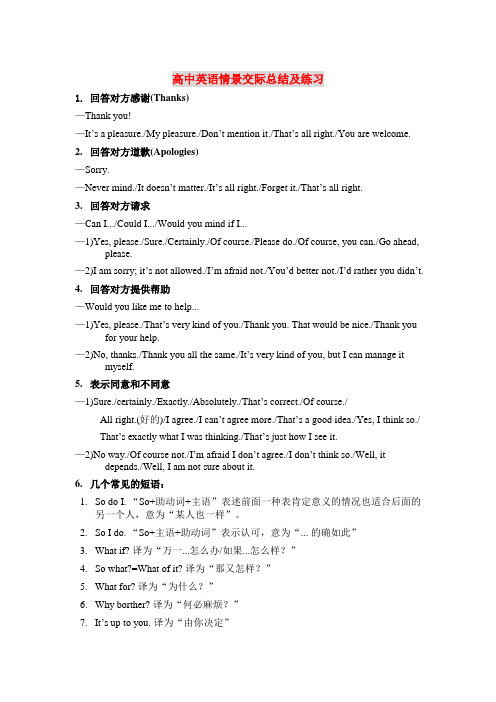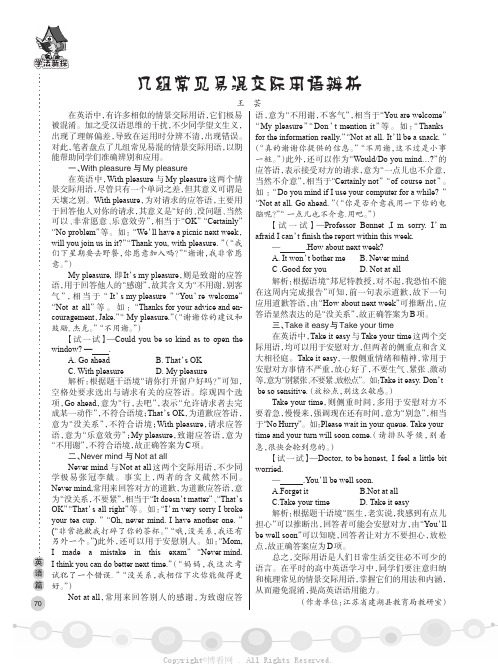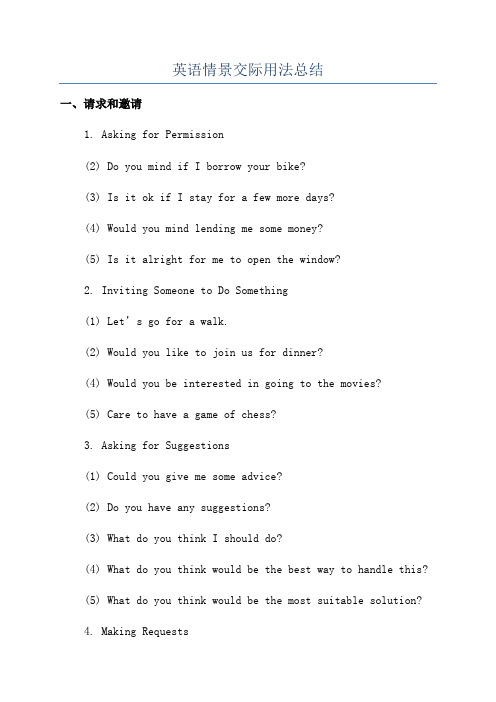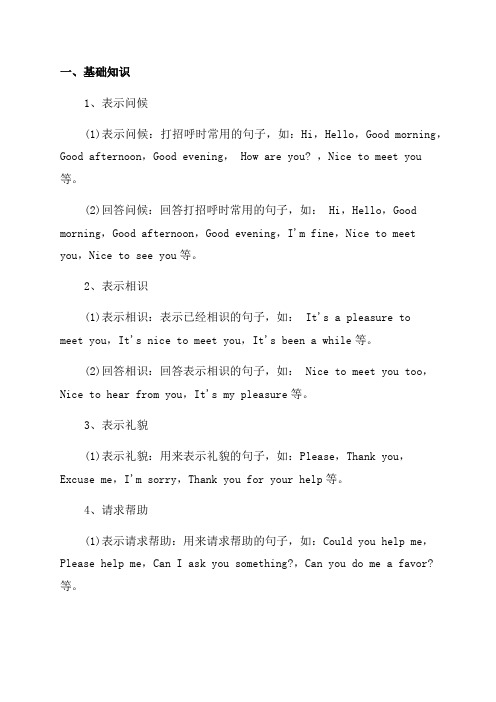情景交际用语用法解析
高考英语情景交际题用法总结及练习30题含答案

高中英语情景交际总结及练习1.回答对方感谢(Thanks)—Thank you!—It’s a pleasure./My pleasure./Don’t mention it./That’s all right./You are welcome. 2.回答对方道歉(Apologies)—Sorry.—Never mind./It doesn’t matter./It’s all right./Forget it./That’s all right.3.回答对方请求—Can I.../Could I.../Would you mind if I...—1)Yes, please./Sure./Certainly./Of course./Please do./Of course, you can./Go ahead, please.—2)I am sorry; it’s not allowed./I’m afraid not./You’d better not./I’d rather you didn’t.4.回答对方提供帮助—Would you like me to help...—1)Yes, please./That’s very kind of you./Thank you. That would be nice./Thank you for your help.—2)No, thanks./Thank you all the same./It’s very kind of you, but I can manage it myself.5.表示同意和不同意—1)Sure./certainly./Exactly./Absolutely./That’s correct./Of course./All right.(好的)/I agree./I can’t agree more./That’s a good idea./Yes, I think so./ That’s exactly what I was thinking./That’s just how I see it.—2)No way./Of course not./I’m afraid I don’t agree./I don’t think so./Well, it depends./Well, I am not sure about it.6.几个常见的短语:1.So do I. “So+助动词+主语”表述前面一种表肯定意义的情况也适合后面的另一个人,意为“某人也一样”。
几组常见易混交际用语辨析

学法新探在英语中,有许多相似的情景交际用语,它们极易被混淆。
加之受汉语思维的干扰,不少同学望文生义,出现了理解偏差,导致在运用时分辨不清,出现错误。
对此,笔者盘点了几组常见易混的情景交际用语,以期能帮助同学们准确辨别和应用。
一、With pleasure 与My pleasure 在英语中,With pleasure 与My pleasure 这两个情景交际用语,尽管只有一个单词之差,但其意义可谓是天壤之别。
With pleasure ,为对请求的应答语,主要用于回答他人对你的请求,其意义是“好的、没问题、当然可以、非常愿意、乐意效劳”,相当于“OK ”“Certainly ”“No problem ”等。
如:“We ’ll have a picnic next week ,will you join us in it?”“Thank you,with pleasure.”(“我们下星期要去野餐,你愿意加入吗?”“谢谢,我非常愿意。
”)My pleasure,即It ’s my pleasure ,则是致谢的应答语,用于回答他人的“感谢”,故其含义为“不用谢,别客气”,相当于“It ’s my pleasure ”“You ’re welcome ”“Not at all ”等。
如:“Thanks for your advice and en-couragement ,Jake.”“My pleasure.”(“谢谢你的建议和鼓励,杰克。
”“不用谢。
”)【试一试】—Could you be so kind as to open the window?—.A.Go aheadB.That ’s OKC.With pleasureD.My pleasure 解析:根据题干语境“请你打开窗户好吗?”可知,空格处要求选出与请求有关的应答语。
综观四个选项,Go ahead ,意为“行,去吧”,表示“允许请求者去完成某一动作”,不符合语境;That ’s OK ,为道歉应答语,意为“没关系”,不符合语境;With pleasure ,请求应答语,意为“乐意效劳”;My pleasure ,致谢应答语,意为“不用谢”,不符合语境,故正确答案为C 项。
英语情景交际用法总结

英语情景交际用法总结一、请求和邀请1. Asking for Permission(2) Do you mind if I borrow your bike?(3) Is it ok if I stay for a few more days?(4) Would you mind lending me some money?(5) Is it alright for me to open the window?2. Inviting Someone to Do Something(1) Let’s go for a walk.(2) Would you like to join us for dinner?(4) Would you be interested in going to the movies?(5) Care to have a game of chess?3. Asking for Suggestions(1) Could you give me some advice?(2) Do you have any suggestions?(3) What do you think I should do?(4) What do you think would be the best way to handle this?(5) What do you think would be the most suitable solution?4. Making Requests(1) Can you help me with my homework?(2) Could you please pass me the salt?(3) Could you do me a favor?(4) Would you mind giving me a hand?(5) Can you take a look at this for me?二、表示拒绝1. Polite Refusal(1) I’m sorry, but I can’t.(2) No, I’m afraid not.(3) I’m afraid it’s not convenient for me.(4) I’m sorry, I have other plans.(5) That’s very kind of you, but I can manage.2. Firm Refusal(1) I’m sorry, I won’t be able to do that.(2) No, I can’t do that.(3) I’m sorry, I won’t be able to take up your offer.(4) No, I’m afraid that’s out of the question.(5) I’m sorry, I have to refuse.三、表达感谢1. Expressing Gratitude(1) Thanks a lot.(2) I really appreciate it.(3) Thank you for your help.(4) Thanks for your kind assistance.(5) I’m very grateful for your hospitality.2. Accepting Thanks(2) It’s my pleasure.(3) Don’t mention it.(4) It’s nothing.(5) Glad to be of help.四、表达道歉1. Apologizing(1) I’m sorry about the mistake.(2) Please forgive me for my carelessness.(3) I apologize for my behavior.(4) I apologize for not being able to attend.(5) I apologize for any inconvenience caused.2. Accepting Apology(1) That’s alright.(2) Don’t worry about it.(3) It’s ok.(4) Don’t mention it.(5) That’s quite all right.五、表达鼓励1. Encouraging Someone(1) You can do it.(2) Hang in there.(3) You’re doing great.(4) I believe in you.(5) Keep it up.2. Accepting Encouragement(1) Thank you.(2) I really appreciate it.(3) That means a lot to me.(4) I’m glad to have your support.(5) You’ve given me the courage to go on.六、表达肯定1. Expressing Agreement (1) That’s a great idea.。
六年级情景交际知识点总结

一、基础知识1、表示问候(1)表示问候:打招呼时常用的句子,如:Hi,Hello,Good morning,Good afternoon,Good evening, How are you? ,Nice to meet you等。
(2)回答问候:回答打招呼时常用的句子,如: Hi,Hello,Good morning,Good afternoon,Good evening,I'm fine,Nice to meet you,Nice to see you等。
2、表示相识(1)表示相识:表示已经相识的句子,如: It's a pleasure tomeet you,It's nice to meet you,It's been a while等。
(2)回答相识:回答表示相识的句子,如: Nice to meet you too,Nice to hear from you,It's my pleasure等。
3、表示礼貌(1)表示礼貌:用来表示礼貌的句子,如:Please,Thank you,Excuse me,I'm sorry,Thank you for your help等。
4、请求帮助(1)表示请求帮助:用来请求帮助的句子,如:Could you help me,Please help me,Can I ask you something?,Can you do me a favor?等。
(2)回答请求帮助:回答表示请求帮助的句子,如:Yes,Sure,What can I do for you?,I'll be glad to help,No problem等。
5、邀请(2)回答邀请:回答表示邀请的句子,如:Yes,I'd love to,Sure,I'd be happy to,No problem等。
6、表示感谢(1)表示感谢:用来表示感谢的句子,如:Thank you,Thanks a lot,Thank you for your help,I really appreciate it等。
高考英语情景交际用法详解

高考英语情景交际用法详解一、单项选择情景交际1. — Are you going to take part in the speech contest?—________ It’s too good an opportunity to miss.A. No problem.B. That’s for sure.C. Why me?D. How come?【答案】B【解析】【详解】考查交际用语。
句意: ——你准备参加演讲比赛吗?——那当然, 这是个不容错过的好机会。
A.No problem.没问题;B.That’s for sure.那当然, 毫无疑问;C.Why me? 为什么是我;D.How come? 为什么, 怎么回事。
根据后半部分他做出的回答, 可知该处应做出爽快的肯定式回答, 故选B。
【点睛】本题有两个易错点, 应引起注意。
一是回答中的“too…to…”结构, 学生可能会据此直接判定为否定, 但结合miss(错过)的含义, 应为“不容错过的好机会”, 类似于双重否定表肯定;二是No problem.与That’s for sure.的辨析, 虽然两者都是一种爽快的肯定, 但前者更多用于答应别人提出的请求, 而后者则用于给予别人问题一个肯定的回答(对别人的说法表示赞同), 两者应注意区别。
2. ---You don't so well, Betty.What's the matter with you?---I’m going to have the first round of interview tomorrow, so I’m____.A. feeling on cloud nineB. feeling hot under the collarC. felling down in the dumpsD. feeling butterflies in my stomach【答案】D【解析】【详解】考查习惯用语。
【英语】英语情景交际用法详解(1)

A.You got itB.You speakC.That’s itD.It’s up to you
【答案】D
【解析】
【详解】
考查情景交际。句意:--爸爸,你认为我大学应该选什么专业?--这由你决定。你应该根据你的兴趣来选择。A. You got it你明白了;B. You speak你说;C. That’s it就这样;D.It’s up to you由你决定。分析句意可知,爸爸的意思是选择什么专业由他自己决定。结合选项,故选D。
【答案】D
【解析】
【详解】
考查情景交际。句意:——我担心找不到汽车锁匙了。——沉住气。我会等你的。我们时间足够。A. Hurry up.快点。B. All right.好的。C. It is up to you.这取决于你。D. Hold your horses.沉住气,别冒火。在情景对话中,前一句是担心,所以回答的应该是有关安慰的话,选项D切题。故选D。
---.The floating cities are perhaps an alternative solution.
A.I beg to differB.I think otherwiseC.You have me thereD.You have a point there
【答案】D
【解析】
【详解】
3.- Haven't we met before?You seem to be Mr.Richard.
-______.Did we meet at James' birthday party?
英语情景交际用法总结(完整)
高中英语情景交际总结及练习1.回答对方感谢(Thanks)—Thank you!—It’s a pleasure./My pleasure./Don’t mention it./That’s all right./You are welcome. 2.回答对方道歉(Apologies)—Sorry.—Never mind./It doesn’t matter./It’s all right./Forget it./That’s all right.3.回答对方请求—Can I.../Could I.../Would you mind if I...—1)Yes, please./Sure./Certainly./Of course./Please do./Of course, you can./Go ahead, please.—2)I am sorry; it’s not allowed./I’m afraid not./You’d better not./I’d rather you didn’t.4.回答对方提供帮助—Would you like me to help...—1)Yes, please./That’s very kind of you./Thank you. That would be nice./Thank you for your help.—2)No, thanks./Thank you all the same./It’s very kind of you, but I can manage it myself.5.表示同意和不同意—1)Sure./certainly./Exactly./Absolutely./That’s correct./Of course./All right.(好的)/I agree./I can’t agree more./That’s a good idea./Yes, I think so./ That’s exactly what I was thinking./That’s just how I see it.—2)No way./Of course not./I’m afraid I don’t agree./I don’t think so./Well, it depends./Well, I am not sure about it.6.几个常见的短语:1.So do I. “So+助动词+主语”表述前面一种表肯定意义的情况也适合后面的另一个人,意为“某人也一样”。
高中英语情景交际用法总结及经典习题(含答案)
高中英语情景交际总结及练习1.回答对方感谢(Thanks)—Thank you!—It’s a pleasure./My pleasure./Don’t mention it./That’s all right./You are welcome. 2.回答对方道歉(Apologies)—Sorry.—Never mind./It doesn’t matter./It’s all right./Forget it./That’s all right.3.回答对方请求—Can I.../Could I.../Would you mind if I...—1)Yes, please./Sure./Certainly./Of course./Please do./Of course, you can./Go ahead, please.—2)I am sorry; it’s not allowed./I’m afraid not./You’d better not./I’d rather you didn’t.4.回答对方提供帮助—Would you like me to help...—1)Yes, please./That’s very kind of you./Thank you. That would be nice./Thank you for your help.—2)No, thanks./Thank you all the same./It’s very kind of you, but I can manage it myself.5.表示同意和不同意—1)Sure./certainly./Exactly./Absolutely./That’s correct./Of course./All right.(好的)/I agree./I can’t agree more./That’s a good idea./Yes, I think so./ That’s exactly what I was thinking./That’s just how I see it.—2)No way./Of course not./I’m afraid I don’t agree./I don’t think so./Well, it depends./Well, I am not sure about it.6.几个常见的短语:1.So do I. “So+助动词+主语”表述前面一种表肯定意义的情况也适合后面的另一个人,意为“某人也一样”。
广东小高考英语的情景交际
广东小高考英语中情景交际的常见场景包括以下几个方面:
1.问候和告别:这是任何语言中最常见的交际场景之一。
在英语中,常见的问
候和告别用语包括“Hello”,“Good morning”,“Goodbye”等。
2.介绍:当你想向别人介绍自己或者别人时,需要使用正确的交际用语。
例如,
“My name is...”,“I'm a student from...”。
3.请求和提供帮助:在英语交际中,请求和提供帮助是非常常见的场景。
例如,
“Can you help me?”,“Sure, what is it?”。
4.感谢和道歉:在日常生活中,我们经常需要表达感谢和道歉。
例如,“Thank
you”,“I'm sorry”。
5.购物和询问信息:在英语中,购物和询问信息也是常见的交际场景。
例如,
“How much is it?”,“Where can I find...?”。
6.打电话和留言:在英语中,打电话和留言也是常见的交际场景。
例如,“Hello,
may I speak to...?”,“Please leave a message after the beep”。
7.表达观点和感受:在英语中,表达观点和感受也是常见的交际场景。
例如,
“I think...”,“I feel...”。
【英语】英语情景交际用法详解
一、单项选择情景交际
1.— We’ d better invite Tom to the Friday meeting.
— Yes, ______? I’ll call him at once.
A.why notB.what forC.whyD.what
【答案】A
【解析】
3.---Hi, Bob! Thanks a lot for lending me the money!
---____! Oh, by the way the interest rate is 10%.
A.With regards B.With pleasure C.No sweat D.No way
【点睛】
情景对话题主要考查英语的日常用语、习惯用语以及各种场合的交际性语言,并从实际出发,考查交际语言的运用能力。做题时仔细阅读上下文,找出上下文之间的联系。
13.—No words are strong enough to express our heartfelt thanks for your assistance.
—________.
A.Take it easyB.With pleasureC.It’s my pleasureD.Never mind
【答案】C
【解析】
【详解】
考查情境交际用语。句意:——对你的帮助,我无法用言语来表达我们衷心的感谢。——别客气。A. Take it easy别着急;B. With pleasure我很乐意;C. It’s my pleasure不客气;D. Never mind没有关系。结合句意故选C。
【详解】
考查情景交际。句意:——我们最好邀请汤姆参加星期五的会议。——是的,为什么不呢?我马上给他打电话。A. why not为什么不;B. what for为何目的;C. why为什么;D. what什么。此对话上句是在征求建议,根据回答,why not符合题意。故选A。
- 1、下载文档前请自行甄别文档内容的完整性,平台不提供额外的编辑、内容补充、找答案等附加服务。
- 2、"仅部分预览"的文档,不可在线预览部分如存在完整性等问题,可反馈申请退款(可完整预览的文档不适用该条件!)。
- 3、如文档侵犯您的权益,请联系客服反馈,我们会尽快为您处理(人工客服工作时间:9:00-18:30)。
情景交际用语用法解析情景交际用语的特点对情景交际的考查是英语高考中的一种潮流。
它的目的主要在于考查考生对英语知识的理解及应用,从而检测出考生的英语驾驭能力。
1.英语交际用语范围广泛,形式多样。
语言灵活多变,表达常随不同语境而变化。
2.有些交际用语与英美人的文化背景、风俗习惯联系密切。
(一)日常交际用语组成部分1.功能意念部分包括问候,介绍,告别,感谢和应答,祝愿、祝贺和应答,邀请和应答,提供(帮助等)和应答,约会,意原和希望,请求、允许和应答;同意和不同意,喜好和厌恶,决断和坚持,判断和意见,职责,能力,偏爱,责备和抱怨,肯定和不肯定,禁止和警告,可能和不可能,预见、猜测和相信,请求,劝告和建议,许诺,提醒,表示焦虑,表示惊奇,表示喜悦等三十余项。
2.情景场所部分包括谈论天气,购物,问路和应答,问时间、日期和应答,就餐,打电话,传递信息,看病,求救,语言困难,标志和说明等十余项。
(二)日常交际用语的语境与应用语言的应用不是静止的、机械的,所谓的“真实英语”也就是指来源于生活实际的应用语言,因此,语言知识和应用能力也必定在实践中得到提高。
应用意味着什么?概括地讲,就是特定的语境,而具体地讲,则包括:1.特定的时间、地点和物化环境2.特定的目的和动机3.特定的参与人4.特定的生活角色扮演5.特定的行动过程6.特定的内心过程7.特定的信息处理过程8.特定的结果只有在特定的语境中语言才显示出它真正的意义。
交际用语就是在上述特定语境中的语言应用。
只有不断积累语言知识,才能达到语言运用能力的提高。
命题趋势及备考准备:由于高考单项填空试题中口语化趋势已十分明显,尤其是在听力试题中对交际用语的考查更为突出。
因此,今后的高考命题不但不会降低对交际用语的考查力度,反而会进一步加大考查力度。
特别是交际用语中有关表达欣赏、赞美、征询意见、看法、劝说等的知识将会是今后高考命题的热点。
由此可见,这类题内容丰富,范围广,并无一定的模式。
每一个人对于交际中所出现的情形都无法预料,因此,考生在复习中应从以下几方面着手:1.熟悉句型结构,增强理解能力;2.进行广泛阅读,积累各种情景中交际应酬的用语从而提高交际能力;3.熟悉中、英两种文化差异,掌握两个不同民族的交际习惯方式:4.多看英文电视、电影,多跟外国人交谈,从而提高英语实际运用能力。
这类题虽然没有固定规律可寻,但只要交际能力提高了,解答这类题目就非常容易了。
近几年来的考试结果,也说明了这一点。
因此同学们不必担心害怕。
只要我们在平时的学习中注意这些问题,考试是不难的。
例题解析1.—It’s cloudy outside. Please take an umbrella.--________________.A. Yes, take it easily.B. Well, it just dependsC. OK, just in caseD. All right, you’re welcome2.. -- Would you mind my coming over and having a look at your new garden? My little son’s curious about those roses you grow.--- ______. You are welcome.A. Yes, I doB. Never mindC. Yes, pleaseD. Not at all3. --- Can I speak to Mr. Wang, please?--- _______.A. Who are you?B. I’m Wang.C. Speaking.D. Are you John?4.. --- Would you like some more tea?--- ________ , please.A. No, moreB. Just a littleC. I’ve had enoughD. Yes, I would5. --- Oh dear! I’ve broken a window.--- ______. It can’t be helped.A. Never mindB. All rightC. That’s fineD. Not at all6. --- Susan, will you please go and empty that drawer?--- ______?A. What forB. What is itC. How is itD. How come7. --We’d like you to start work tomorrow if possible.--I’m sorry, but I can’t possibly start until Monday. ________?A. Do you agree with meB. Is that a good ideaC. Do you think I’m rightD. Will that be all right8. –We missed you at this morning’s meeting, Diana.---____, but if I hadn’t had met a friend, I would have been there.A. Me, tooB. I’m sorryC. Never mindD. Thank you9. Tom: Mike, our team will play against the Rockets this weekend. I’m sure we will win.Mike: __________!A. CongratulationsB. CheersC. Best wishedD. Good luck10. --- What do you want to do next? We have half an hour until the basketball game.--- _______. Whatever you want to do is fine with me.A. It just dependsB. It’s up to youC. All rightD. Glad to hear that解析:1.C上文提到天气多云,带雨伞,所以答语应为―以防万一‖。
Take it easy别紧张;it depends 看情况而定;看情况而定;you’re welcome不用谢,都不合语境。
2.D上句问Would you mind…, 回答应是―不介意‖;而Never mind一般是对Sorry 的回答,来宽慰道歉的一方。
因此选D,表示自己一点也不介意。
3.Cspeaking 是打电话的习惯用语,表示接电话的人正是对方要找的人。
4. Bjust a little 只要一点。
根据please 可判断出对方需要喝茶。
5.A根据―我把窗子打坏了‖这个语境答语,可排除B,C。
而D常用来回答Thank you.或Do/Would you mind…?故排除D。
never mind意为―没关系,这是避免不了的‖。
6.A根据语境,答语中问的是目的。
其实这是个省略句,补全后应为―I’ll go and empty that drawer for what.‖,what 提前构成疑问句就成了what for 或for what。
7.D句意:甲:如果可能的话,我们希望你明天就开始工作。
乙:对不起,到下周一才有可能开始。
那样行吗?因此,只有D项合乎题意。
8.B戴安纳,我们在今天早晨的会议上没见到你。
I’m sorry 是应答的最佳选项。
―对不起,要不是非得去见一个朋友,我就去开会了。
‖Me, too我也是;never mind不要紧;thank you 谢谢;都不合题意。
9.Dcongratulations祝贺(你们获得成功),而由上句知比赛还没有进行,故排除A。
cheers 加油,best wishes问候,都不合题意。
Good luck祝你们好运,符合语境。
10.B从语境Whatever you want to do is fine with me. 可看出:随便你怎么做都行;It just depends 具体情况具体对待;It’s up to you 随你的便,由你决定。
常用交际用语1. After you.你先请。
这是一句很常用的客套话,在进/出门,上车得场合你都可以表现一下。
2. I just couldn't help it.我就是忍不住。
想想看,这样一个漂亮的句子可用于多少个场合?I was deeply moved by the film and I cried and cried. I just couldn't help it.3. Don't take it to heart.别往心里去,别为此而忧虑伤神。
生活实例:This test isn't that important. Don't take it to heart.4. We'd better be off.我们该走了。
It's getting late. We'd better be off .5. Let's face it.面对现实吧。
常表明说话人不愿意逃避困难的现状。
例句:I know it's a difficult situation. Let's face it, OK?6. Let's get started.咱们开始干吧。
劝导别人时说:Don't just talk. Let's get started.7. I'm really dead.我真要累死了。
坦诚自己的感受时说:After all that work, I’m really dead.8. I've done my best.我已尽力了。
9. Is that so?真是那样吗?常用在一个人听了一件事后表示惊讶、怀疑。
10. Don't play games with me!别跟我耍花招!11. I don't know for sure.我不确切知道。
Stranger:Could you tell me how to get to the town hall?Tom: I don't know for sure. Maybe you could ask the policeman over there.12. I'm not going to kid you.我不是跟你开玩笑的。
